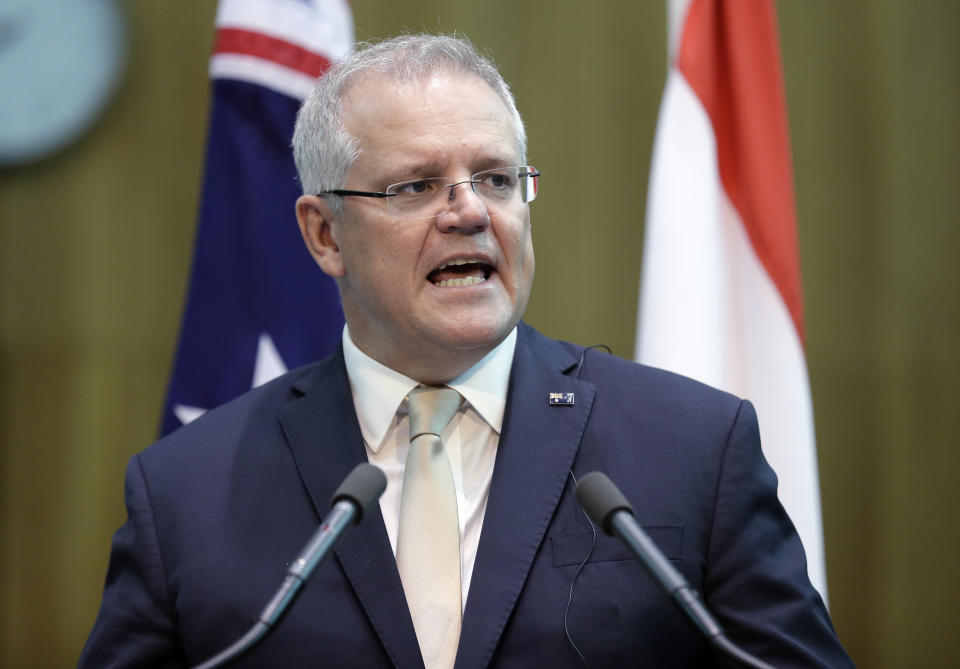SHARES PLUNGE: 2020 to be worst year since 2009

The ASX has plunged more than 3 per cent in early Friday trade as coronavirus sends shockwaves through global markets.
The S&P/ASX200 was down 203.3 points, or 3.05 per cent, at 6,454.6 at 1010 AEDT on Friday with all sectors in the red. That brings total losses to more than 10 per cent since the local market peaked last week, and weekly losses to around $70 billion.
The broader All Ordinaries index fell 209.6 points, or 3.11 per cent, to 6,527.8 points.
Australia’s Friday morning bloodbath comes as the global economy careens towards its worst year since 2009 as coronavirus takes out sector after sector, economists have warned.
Global growth will fall to 2.8 per cent in 2020 - the lowest since 2009 and 0.3 percentage points lower than the previously expected 3.1 per cent, Bank of America economists said on Thursday.
"The risks are still skewed to the downside," the Bank of America said.
"Our forecasts do not include a global pandemic that would basically shut down economic activity in many major cities."
The Bank said the global economy has “little buffer against a major shock”, as reported by Bloomberg.
“Unfortunately the COVID-19 outbreak is turning out to be that shock."
The Bank’s warning came as Wall Street saw a week-long haemorrhage.
The Dow Jones Industrial Average on Thursday (Friday morning AEST) closed down a huge 1,190 points, taking it to a weekly loss of 3,200 points - its worst performance since the Global Financial Crisis.
That plummet came off the back of news that California is monitoring 8,400 potential cases of the respiratory illness.
The S&P 500 also finished 12 per cent lower than its record high on February 19 - its fastest drop ever.
The International Monetary Fund this week also warned the illness poses “tremendous uncertainty” for the global economy.
“This week and next week is going to be very crucial for determining how successful the world has been containing the virus and implications of that,” IMF Chief Economist Gita Gopinath told Yahoo Finance US in an exclusive interview.
“There is a scenario where all the hit takes place in the first quarter and by April, like a v-shape, China is back to normal.”
Escalating coronavirus threat

The virus has now killed nearly 2,800 people worldwide, with public health officials across the globe warning it is heading into pandemic territory.
In the US, representatives from the Centers for Disease Control and the Food and Drug Administration have said the nation is “on the cusp” of a pandemic.
World Health Organisation (WHO) Director General Tedros Adhanom Ghebreyesus has also described the illness as having “pandemic potential”, while Australia’s deputy chief medical officer Paul Kelly said he is “surprised” it hasn’t been called a pandemic yet.
Australian impact

According to the Tourism and Transport Forum of Australia, coronavirus will hit the country’s tourism sector with 1.8 million fewer visitors expected in the first six months of 2020.
That’s a fall of 40 per cent on the same period in 2019.
"What we are facing is a contracted visitor economy with significant losses across international visitation, tourism spend and employment in 2020 and beyond," chief executive Margy Osmond said.
It’s something small business operators are also experiencing.
“Sales have been dramatically dropping - 60 per cent on weekends and 80 per cent on weekdays,” Orlando Sanpo, business development manager for EFC Group, revealed to Yahoo Finance.
Sanpo works with Da Long Yi, Gotcha Fresh Bubble Tea and JiYu in Sydney’s Chinatown.
He said casual staff’s shifts have been cut due to significantly slower foot traffic.
“It affects the economy and the dining environment in Chinatown as it’s looking like a dead town,” he said.
Australia’s education sector is also reeling as the travel ban for non-citizens travelling from China extends into another week.
Prime Minister Scott Morrison said Australia needs to prepare for a global pandemic, and the extended ban is one such measure.
But that’s little comfort to the 100,000 Chinese students unable to return to Australia to attend class.
Australia’s international education sector contributes around $34 billion to the economy, with Australian universities relying on Chinese money, according to the Centre for Independent Studies.
With AAP.
Make your money work with Yahoo Finance’s daily newsletter. Sign up here and stay on top of the latest money, news and tech news.
Follow Yahoo Finance Australia on Facebook, Twitter, Instagram and LinkedIn.



